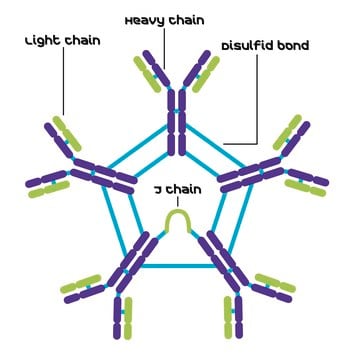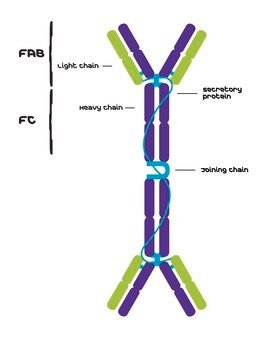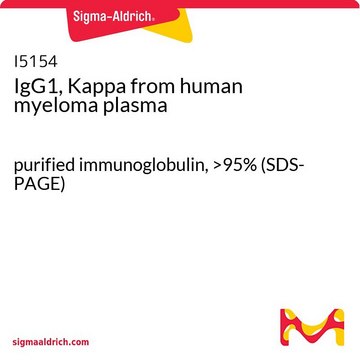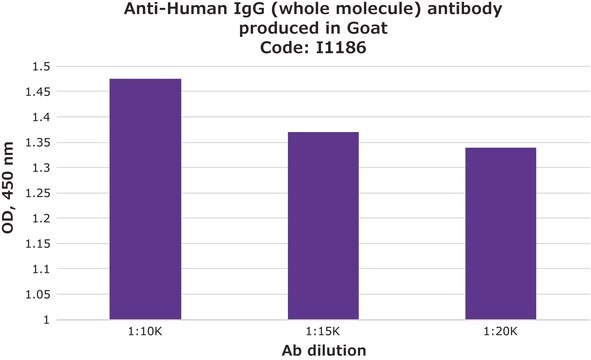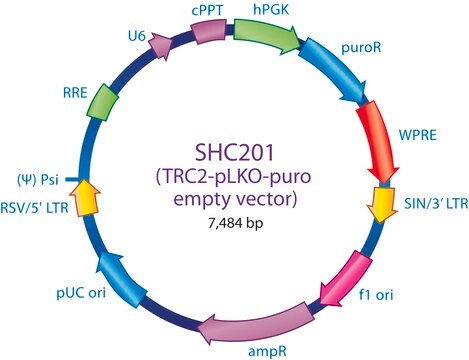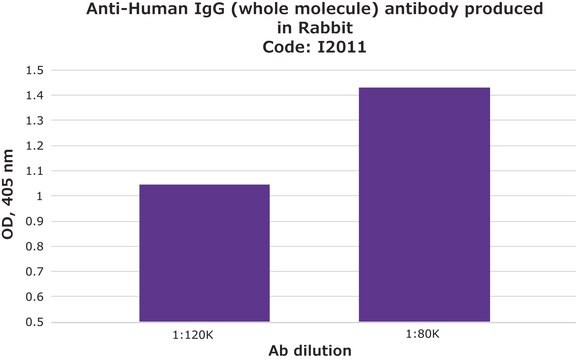I2511
IgG from human serum
reagent grade, ≥95% (HPLC), buffered aqueous solution
Synonym(s):
Human IgG
Sign Into View Organizational & Contract Pricing
All Photos(1)
About This Item
Recommended Products
conjugate
unconjugated
Quality Level
grade
reagent grade
Assay
≥95% (HPLC)
form
buffered aqueous solution
shipped in
dry ice
storage temp.
−20°C
target post-translational modification
unmodified
Looking for similar products? Visit Product Comparison Guide
General description
IgG antibody subtype is the most abundant serum immunoglobulins of the immune system. It is secreted by B cells and is found in blood and extracellular fluids and provides protection from infections caused by bacteria, fungi and viruses. Maternal IgG is transferred to fetus through the placenta that is vital for immune defence of the neonate against infections
Human IgG is purified from normal human serum by precipitation and gel filtration techniques.
Human IgG is purified from normal human serum by precipitation and gel filtration techniques.
Application
Purified human IgG has been used :-
- as blocking antibody for flow cytometry
- as negative control in chromatin immunoprecipitation assays
- to precipitate IgG in human larynx epidermoid carcinoma cells by immunoprecipitation
- as a standard in enzyme-linked immunosorbent assay
Biochem/physiol Actions
Immunoglobulin G (IgG) regulates the immune responses such as phagocytosis and is also involved in the development of autoimmune diseases. IgG1 regulates complement fixation in mice.
Physical form
Solution in 0.01 M phosphate buffered saline, pH 7.4, containing 15 mM sodium azide
Disclaimer
Unless otherwise stated in our catalog or other company documentation accompanying the product(s), our products are intended for research use only and are not to be used for any other purpose, which includes but is not limited to, unauthorized commercial uses, in vitro diagnostic uses, ex vivo or in vivo therapeutic uses or any type of consumption or application to humans or animals.
Storage Class Code
12 - Non Combustible Liquids
WGK
WGK 1
Flash Point(F)
Not applicable
Flash Point(C)
Not applicable
Choose from one of the most recent versions:
Already Own This Product?
Find documentation for the products that you have recently purchased in the Document Library.
Customers Also Viewed
In-Kyu Yoon et al.
The American journal of tropical medicine and hygiene, 72(6), 714-718 (2005-06-21)
Volunteers vaccinated with a candidate malaria vaccine containing merozoite surface protein 1(42) (MSP-1(42)) exhibit antibodies to MSP-1(42) that are measured by enzyme-linked immunosorbent assay (ELISA). The purpose of this study was to make a human reference standard for MSP-1(42) antibody
Kentaro Matsuda et al.
The Journal of allergy and clinical immunology, 116(6), 1357-1363 (2005-12-13)
Mouse monoclonal IgE antibodies can promote the survival of mouse bone marrow-derived cultured mast cells and induce the cells to secrete mediators in the absence of known specific antigen. To determine whether human IgE, in the absence of known specific
D R McArthur et al.
Colorectal disease : the official journal of the Association of Coloproctology of Great Britain and Ireland, 11(7), 775-782 (2008-08-12)
Trials investigating colorectal cancer (CRC) chemoprophylaxis with cyclooxygenase-2 (COX-2) inhibitors have been discontinued because of adverse cardiovascular effects. Nevertheless, identification of patients where beneficial, chemo-prophylactic effects of COX-2 inhibitors outweigh side-effects may be possible; this study aimed to investigate whether
Charles C Chu et al.
Blood, 112(13), 5122-5129 (2008-09-25)
Leukemic B lymphocytes of a large group of unrelated chronic lymphocytic leukemia (CLL) patients express an unmutated heavy chain immunoglobulin variable (V) region encoded by IGHV1-69, IGHD3-16, and IGHJ3 with nearly identical heavy and light chain complementarity-determining region 3 sequences.
Alberto Sinibaldi et al.
Biosensors, 8(3) (2018-07-26)
Optical biosensors based on one-dimensional photonic crystals sustaining Bloch surface waves are proposed to study antibody interactions and perform affinity studies. The presented approach utilizes two types of different antibodies anchored at the sensitive area of a photonic crystal-based biosensor.
Our team of scientists has experience in all areas of research including Life Science, Material Science, Chemical Synthesis, Chromatography, Analytical and many others.
Contact Technical Service

